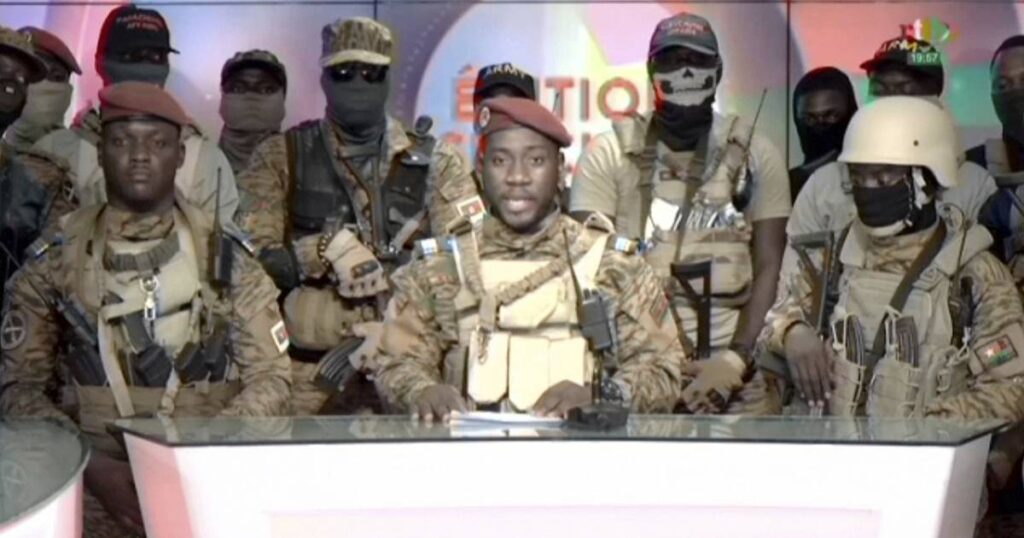Late on Friday (local time), more than a dozen soldiers took over Burkina Faso’s national television and announced that Lt. Col. Paul Henri Sandaogo Damiba, the country’s coup leader turned president, had been removed from office after just nine months in office.
Capt. Ibrahim Traore has been appointed as Burkina Faso’s new military chief, according to a statement read by a junta spokesman. Burkina Faso is a volatile West African nation fighting a growing Islamic insurgency.
The country’s borders had been sealed, according to Burkina Faso’s new military authorities, and a curfew would be in place from 9 p.m. to 5 a.m. The national assembly and transitional government were ordered to dissolve.
The democratically elected president was overthrown by Damiba and his allies, who also promised to increase security in the nation. But the violence has persisted unabated, and in recent months, discontent with his leadership has risen.
The junta spokesman, Capt. Kiswendsida Farouk Azaria Sorgho, read a statement that said, “Faced with the continuously worsening security situation, we the officers and junior officers of the national armed forces were motivated to take action with the desire to protect the security and integrity of our country.”
The soldiers vowed to uphold their promises to the international community and advised the Burkinabes to conduct themselves peacefully.
Damiba had just come back from speaking at the UN General Assembly in New York as the leader of Burkina Faso. But tensions had been escalating for weeks. Despite the fact that the January coup was “possibly repulsive” to the world community, Damiba justified it in his address as “an issue of survival for our nation.”
According to Clingendael researcher Constantin Gouvy, the actions on Friday night “follow rising tensions within the ruling MPSR junta and the larger army.
”
Gouvy stated that “MPSR members felt Damiba was isolating himself and excluding those who assisted him in assuming power.”
In West Africa, where a coup in Mali in August 2020 sparked a wave of military power grabs in the region, Friday’s developments were all too familiar. Nine months after the ouster of Mali’s president in August 2020, the junta’s leader ignored his civilian transition counterparts and took exclusive control of the country. This led to a second coup.
Before the putschists took to the state radio on Friday, some citizens of the nation’s capital Ouagadougou were already demonstrating their support for the change in government.
Many people in Burkina Faso initially supported the military coup last January because they were dissatisfied with the previous administration’s failure to stop the Islamic extremist violence, which has resulted in thousands of deaths and at least 2 million displaced people.
However, since Damiba assumed power, the violence has not decreased.
He also became the defence minister earlier this month after removing a brigadier general from his job.
The Burkinabe junta has a difficult time demonstrating that it has improved security conditions, according to Eric Humphery-Smith, an expert on Africa.
Earlier this week, a supply convoy in the Sahelian Gaskinde community was assaulted by militants, leaving at least 11 soldiers dead and 50 civilians missing.
The president of the Burkina Faso Movement for Human Rights, Chrysogone Zougmore, referred to Friday’s happenings as “extremely sad,” stating that the unrest will not aid in the struggle against the brutality perpetrated by Islamic extremists.
How, you could ask, can we hope to bring the army and the populace together when the latter is so severely divided?
Army officers announce a new coup on Burkina Faso TV.

